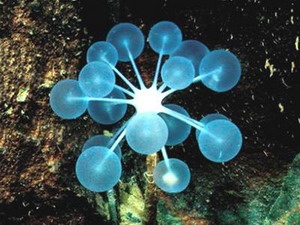In a study report published in Nature, scientists at the University of Queensland have found that sponges have up to 70% of genes similar to humans, many of which are related to cancer and another disease.

Foam Chondrocladia lampadiglobus.
(Artwork. Source: Internet)
The scientific hypotheses have so far affirmed that humans evolved from monkeys, however, a recent study by Australian scientists found that human evidence is closely related to the bottom. sea.
Bernard Degnan, a member of the research team, said the finding would help clarify many issues and could lay the groundwork for breakthroughs in stem cell research and cancer.
Discovering the genetic functions of sponge stem cells can provide "important and deep connections" to genes that affect human stem cell biology, Degnan said. expression.
Previously, American scientists at the University of California have also established the genome sequence of a plankton that consists of only one living cell under the seabed. This genome provides scientists with information about the evolution that comes with a jump from single-celled organisms to multicellular organisms like humans today.
Scientists have released the first genetic diagram of a choanoflagellate called Monosiga brevicollis. For the first time, they also made their comparisons with the genome of multicellular animals (also known as metazoan).
With the consumption of a large number of bacteria, choanoflagellates play an important role in the ocean carbon cycle. But since choanoflagellates and animals share common ancestors from 600 million to about a billion years ago, choanoflagellates hold the key to understanding the origins and evolution of animals.
 'Fine laughs' - Scary and painful torture in ancient times
'Fine laughs' - Scary and painful torture in ancient times The sequence of numbers 142857 of the Egyptian pyramids is known as the strangest number in the world - Why?
The sequence of numbers 142857 of the Egyptian pyramids is known as the strangest number in the world - Why? History of the iron
History of the iron What is alum?
What is alum?